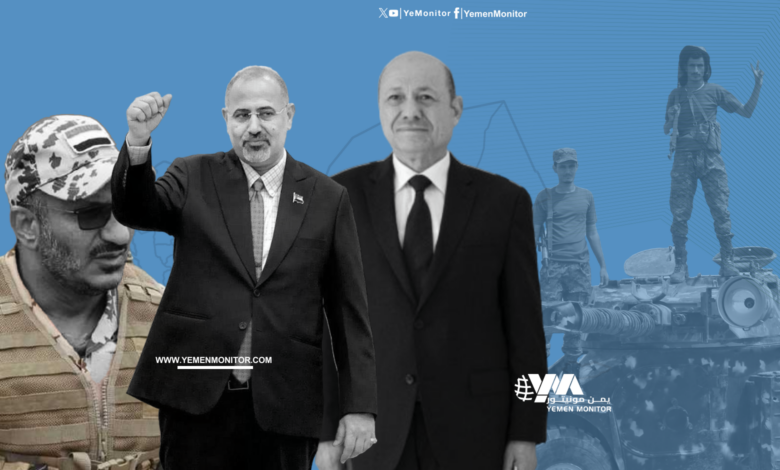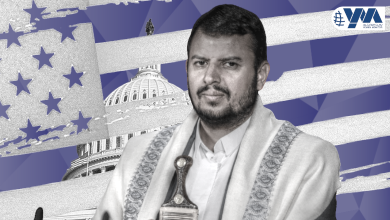
By /Mareb al-Ward
For years, forces under the umbrella of the internationally recognized authority have raised the slogan of “national unity” as a common denominator for restoring the state. However, this slogan has gradually transformed from a means of defeating the Houthis into a problem in itself, fueled by internal conflicts and narrow interests.
After the formation of the “Presidential Leadership Council” in April 2022, there was some optimism about the possibility of unifying efforts, especially with the inclusion of military forces that were previously outside the authority, such as the “National Resistance” and the “Giants Forces.” However, hopes quickly faded as the goal shifted from being a means to achieve a national goal to a stumbling block due to disagreements.
In other words, the model of collective leadership, which was seen as a tool to enhance cooperation, has proven to be limited in its effectiveness, if not a failure, and reinforces the impression that the slogan was exploited to serve limited political goals, such as sharing power, without a serious commitment to the primary objective.
Unifying ranks is not merely a slogan to be raised, but a national necessity imposed by the nature of the battle with a unified enemy that has a clear strategy. This requires overcoming secondary differences, assuming responsibility, and directing efforts towards achieving a real alignment that yields tangible results on the ground.
It is unacceptable for political and military leaders to continue raising the slogan of unity while they are the primary ones responsible for embodying it. Those who run the authority possess the tools and resources necessary to achieve this, but the lack of genuine will undermines these efforts. It is striking that the people seem more committed and eager for unity than the leaders themselves, who call on them to unite instead of taking practical steps to prove their seriousness in this regard.
Despite repeated statements from members of the Presidential Council and party leaders regarding the priority of confronting the Houthis, the reality reflects different priorities for each party, as each seeks to enhance its political and military gains. This is evident in the repeated disputes over interests that drain resources and waste opportunities one after another.
On the other hand, there is no longer any meaning to statements denying the existence of differences that have become clear to everyone. Instead of continuing with this negative approach, there should be transparency and credibility, with an acknowledgment of mistakes and a renunciation of narrow interests in favor of greater national goals.
Achieving real unity requires taking serious steps starting with integrating military formations under the umbrella of the Ministry of Defense and subjecting them to a unified command and a joint operations room. Instead of doing this, each party continues to operate as if it has an independent state, with its own army, security, and intelligence.
In this context, it is of paramount importance to agree on a unified political vision for dealing with the Houthis, which seems far-fetched at present, especially in light of the intransigence of some components, such as the “Southern Transitional Council,” which is not content with demanding an independent delegation in negotiations, despite being part of the authority, but rather presents a vision that guarantees division.
Speaking about these basic requirements does not overlook the challenges that hinder the unification of ranks, which is a mixture of internal and external difficulties. What concerns us here is the failure to overcome the first type of these challenges, which can be summarized in two main elements:
The first: internal disputes aimed at enhancing private gains, where some members show greater interest in expanding their political or military influence instead of achieving common goals. As an example, the repeated armed raids on the presidential headquarters in Aden.
The second: the lack of internal consensus, which is evident in the council’s inability to prepare its internal regulations that govern its work. If the council is unable to deal with such a simple matter, how will it be able to face the big challenges?
Efforts to unify ranks have turned into an internal battle among forces opposing the Houthis, instead of being a means to defeat them. For example, council meetings, which are supposed to result in coordination of efforts, have become occasions to highlight differences. In some cases, it required the intervention of ambassadors of major countries accredited to Yemen to narrow the differences. The most prominent example of this is what happened in recent days in Riyadh, where members from inside and outside were gathered to hold meetings and discuss internal issues.
As a result of this reality, the military momentum against the Houthis has declined since the formation of the council, and administrative and political paralysis has prevailed, so that the focus has shifted to managing or containing internal disputes, as council member Abdullah al-Alimi said, instead of facing national challenges.
On the external level, instead of the international community focusing its support on the council to regain control of the country, as was the case during the era of President Hadi, its attention has shifted to resolving internal disputes among council members and working to unify them. This means that the council has become an additional challenge, which has drained efforts to achieve the primary goal.
Unfortunately, discussions between ambassadors and council members have revolved around unifying them, after it was believed that integrating them into the authority would contribute to achieving the greater goal, which is to end the Houthi coup. But the result was the presentation of an unconvincing image to regional and international parties, making them doubt the council’s ability to be worthy of support to achieve peace and stability.
The continuation of the council in this approach means wasting opportunities to restore the state and enabling the Houthis to strengthen their control and prolong the suffering of citizens.




